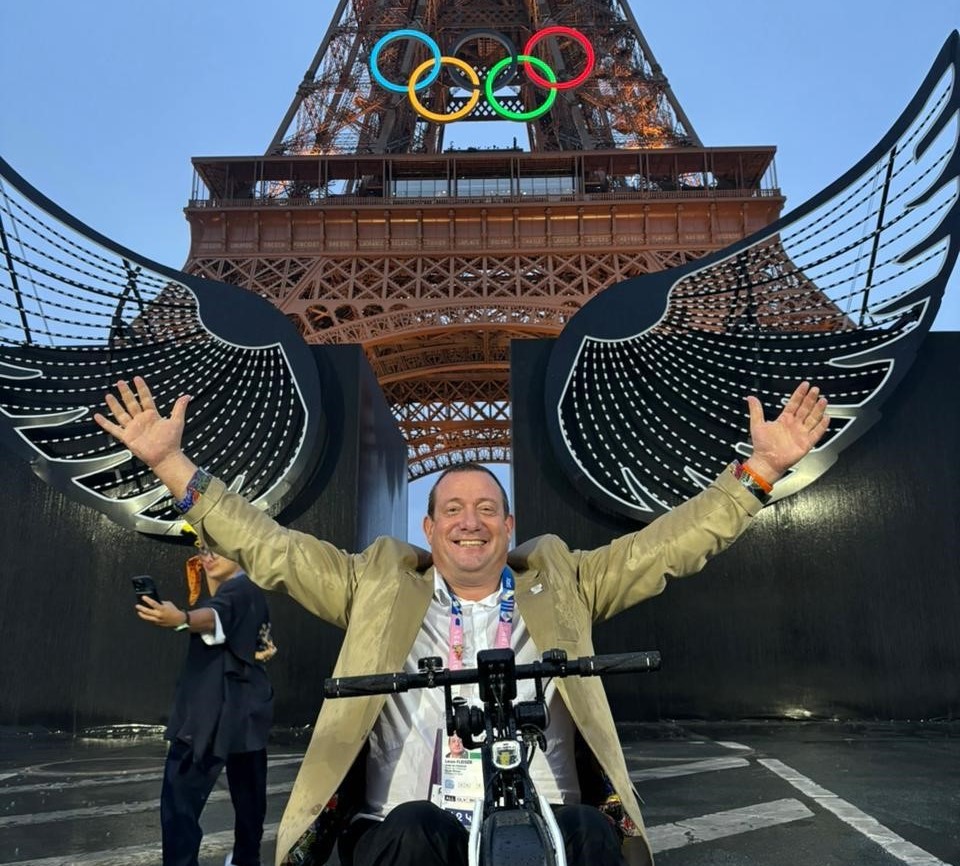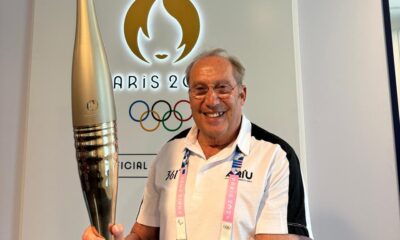
News

Olympian moment for SA’s chief in Paris
“I was certain of that gold medal,” said South Africa’s man on the inside of Team South Africa at the Paris 2024 Summer Olympic Games. He was referring to Tatjana Smith’s nail-biting 100m breaststroke win earlier this week to clinch South Africa’s first gold medal at the Games.
“It took 12 years of planning for that medal, and I’m honoured to be a small part of that journey,” said Leon Fleiser, the former Paralympian who is South Africa’s chef de mission (person in charge of the national team) in Paris, a role that has him on the go 24/7. But he says he’s “soaking up every minute”.
What he means for the 138-odd squad of esteemed athletes is, “I’m their mother, father, lawyer, I’m chief cook and bottle washer,” Fleiser told the SA Jewish Report from Paris. While the nation held its collective breath during Tatjana’s dash to gold on Monday, 29 July, Fleiser watched it from his single custom-issued cardboard box bed in the Olympic Village.
“I felt the start of a cold, and I didn’t want to risk making anyone sick,” he said, admitting that there were tears of joy as Tatjana did her victory lap, embracing her teammates in the Paris La Défense Arena.
“She’s a wonderful woman, and I love the gees in the swimming,” he said, “It’s a small venue, and it gets packed out.”
It’s no wonder Fleiser had early signs of the sniffles – he’s South Africa’s busiest man right now.
“There’s not much sleep going on, but I’m not here to sleep, I’m here to look after the athletes. They are my number one priority,” he said, feeling perky and strong the next day.
The chef de mission position at the Olympics is akin to a seasoned captain navigating a diverse and dynamic crew through rapid waters. He’s the central figure of the national team, the go-to guy, responsible for charting the course from the moment the team is selected until it arrives back home. This will be after the Paralympic Games Paris 2024, which ends on 8 September, where he’s also the chef de mission.
“I will have been away from home for two months,” said the father of three. He grew up in Durban before making aliya with his family at the age of seven, returning to Johannesburg a while later where he attended King David Primary School Linksfield and later Parktown Boys’ High School. “I call home every night, but most days that’s around 23:00 because it only gets dark then.”
Fleiser has been in a wheelchair for more than 30 years due to a shooting incident in Hillbrow, Johannesburg, when he was 20. Reflecting on his journey, he said, “On 25 May 1991, I was shot and paralysed instantly. It was the worst and best day of my life. I have a beautiful wife, Karen, and three amazing children, and I get to travel the world doing what I love. My life wouldn’t be what it is today if it hadn’t happened.”
Fleiser cherishes his life, noting, “Right now, I’m in the Olympic Village, surrounded by the world’s best athletes, and I’m getting paid to be here. There’s only 206 people like me in the world, I feel truly blessed.”
His journey has taken him from being a top-level Paralympic sportsman to a high-level administrator. He captained wheelchair basketball at the Sydney 2000 Paralympics, an experience he said gave him a deep understanding of what it takes to lead a delegation of elite athletes as a chef de mission.
He’s among the first former para-athletes to assume this leadership role at the Olympics. His path as a leader started with his role in Team South Africa’s general management at the Beijing 2008 Games, and he has since been a consistent presence at every Olympics, culminating in his role as the chef de mission at the Tokyo 2020 Paralympics.
“It’s impossible to describe a typical day,” he said. “As I wake up, my phone begins to ring. There’s a problem with someone’s accreditation; an athlete is injured and I need to secure a late replacement; there’s a transport issue that needs attention; a press conference is about to begin; a high-level Olympic meeting; a toilet that needs fixing – it’s endless.”
He’s grateful for his team, including his deputy, Patience Shikwambana. The two, he said, “have each other’s backs”.
In the months leading up to the Games, Fleiser transforms into a meticulous planner, co-ordinating with sports federations, helping to secure funding, and ensuring that every logistical detail is attended to, from securing accommodation in the Olympic Village to arranging travel schedules. He works closely with coaches and athletes, understanding their needs and preferences.
Fleiser is a diplomat, building bridges with international counterparts, navigating complex protocols, and representing the country’s interests in meetings with the International Olympic Committee and other governing bodies. His role requires a delicate balance of assertiveness, chutzpah, and tact.
During the Olympics, Fleiser takes on the role of a chief strategist, overseeing the daily operations of the team. He’s the hub through which all information flows, whether it’s updates on competition schedules, health and safety protocols, or media interactions. In this role, he must remain calm under pressure, quickly adapting to unexpected changes or crises such as an injury or logistical hiccups.
“There are many highs and sadly some lows,” he said, referring to star gymnast Caitlin Rooskrantz’s foot injury this week, which saw her out of the Games.
“It’s heart-breaking, but unfortunately, that’s sport,” Fleiser said.
The hardest part of the job is “when you see the dismay on an athlete’s face when a performance hasn’t gone their way”.
Beyond the competition, Fleiser works with media to ensure that the stories of triumph and perseverance are shared with the world. He also engages with sponsors and stakeholders, fostering relationships that will support future generations of athletes.
In essence, Fleiser is the heartbeat of the South African Olympic team, a true boytjie. He embodies resilience, dedication, and the unifying power of sport, guiding Team South Africa through the highs and lows of the Olympic journey.










